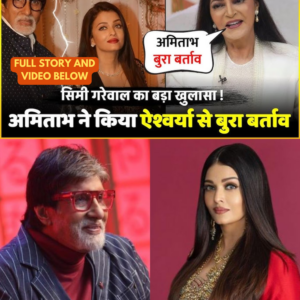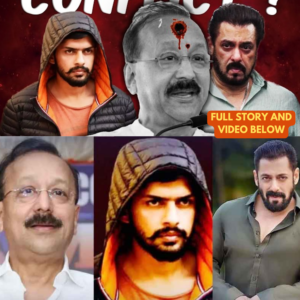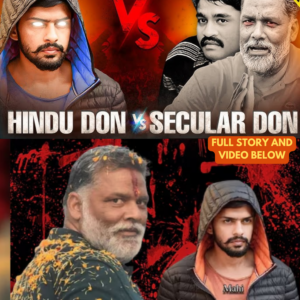Nadeem regained his senses in 24 hours, scolded Salman too, suddenly started respecting Lawrence
In recent news, the infamous gangster Lawrence Bishnoi has been in the spotlight following a series of violent incidents, including the murders of well-known figures like Sidhu Moose Wala and Baba Siddique. Bishnoi has made headlines not only for his criminal activities but also for the threats he has directed at Bollywood star Salman Khan, openly declaring that he would spare Khan if he apologizes at a temple. This alarming behavior has sparked outrage among various communities across India.
Nadeem, a YouTuber from Mumbai, recently gained attention for his bold stance against Bishnoi. In a video, he issued a direct challenge, questioning Bishnoi’s capabilities and proclaiming that the people of Mumbai would no longer be passive. Nadeem’s video went viral, and his call to action resonated with many who were tired of gang violence.
However, in a surprising turn of events, just 24 hours after his initial threats, Nadeem softened his tone during an interview. He expressed admiration for Bishnoi, emphasizing the respect that the Bishnoi community holds for their leader. Nadeem acknowledged that while Bishnoi might want to engage in gang wars, he also recognized the gangster’s desire to promote positive initiatives, such as cow protection and the establishment of gaushalas.
This sudden change in attitude is not isolated. Bihar MP Pappu Yadav also made headlines for his mixed messages regarding Bishnoi. Initially, Yadav threatened to dismantle Bishnoi’s gang, but during a subsequent press conference, he became defensive when reporters asked about Bishnoi, stating that he had already instructed them not to discuss the topic. This inconsistency has raised eyebrows, as political figures navigate their positions in the face of rising gang influence.
Kamal R Khan, another public figure known for his controversial opinions, also commented on Bishnoi. After initially criticizing him, Khan posted a tweet with a playful caption suggesting that Bishnoi could “cool down” tensions, indicating a shift in his own rhetoric. This pattern of quick changes in loyalty and sentiment reflects the broader societal response to Bishnoi’s actions.
The implications of these developments are profound. Bishnoi is not only gaining notoriety within India but is also becoming recognized internationally. Following the assassination of Khalistani terrorist Hardeep Singh Nijjar in Canada, there are claims that Bishnoi’s gang was involved in orchestrating this murder, further cementing his reputation on a global scale.
Bishnoi’s supporters have begun to spin narratives suggesting that he targets only those deemed “anti-national,” attempting to create a sense of legitimacy around his violent actions. This tactic aims to garner sympathy and support from segments of society that may feel disenfranchised or threatened by external forces.
As various public figures and politicians recalibrate their positions regarding Bishnoi, it becomes clear that his influence is permeating multiple layers of society. The response from both the public and influential figures highlights a troubling trend where fear of retribution seems to dictate behavior, leading to abrupt shifts in allegiance.
In conclusion, the saga of Lawrence Bishnoi serves as a microcosm of the larger societal issues in India. The intertwining of crime, politics, and public perception reveals a complex landscape where respect, fear, and admiration coexist. As Bishnoi’s story unfolds, it raises critical questions about the future of law and order in India and the role that influential figures will play in shaping public discourse around crime and violence.
News
Amitabh Bachchan behaved badly with his daughter-in-law Aishwarya Rai | Amitabh IGNORE Aishwarya Rai
In recent weeks, a wave of speculation has emerged suggesting that all may not be well between former Miss World Aishwarya Rai and the iconic Bachchan family. This speculation has captured the attention of fans and the media, as rumors…
Amitabh gave a message to daughter-in-law Aishwarya Rai, said “No matter how your house is, it is yours”
Amitabh Bachchan, the iconic figure of Indian cinema, has a longstanding tradition of engaging with his audience through social media. He often shares reflections on his life, career, and personal philosophies. Recently, a particular post of his has stirred significant…
Salman Khan vs Lawrence Bishnoi | Why it is Happening? |
Salman Khan vs Lawrence Bishnoi | Why it is Happening? | The tension between Bollywood superstar Salman Khan and gangster Lawrence Bishnoi has become a hot topic in recent news. This clash is not just a simple feud; it embodies…
Lawrence Bishnoi Vs Pappu Yadav | Bishnoi Targets Anti-India Mafia?
In the ever-evolving landscape of India’s criminal underworld, a new chapter is unfolding, marked by the dramatic confrontation between notorious gangster Lawrence Bishnoi and the infamous Bihar don, Pappu Yadav. This rivalry has escalated recently, with Bishnoi’s gang issuing a…
LAWRENCE BISHNOI VS SALMAN KHAN, PAKISTANI PUBLIC REACTION AFTER NADEEM KHAN VIRAL VIDEO, REAL TV
The recent controversy involving Bollywood superstar Salman Khan and Lawrence Bishnoi has sparked intense discussions across communities, especially concerning allegations of animal cruelty. The speaker, representing a particular community, emphasizes that if there is evidence that Khan has harmed a…
LAWRENCE BISHNOI’S DIWALI GIFT TO PAPU YADAV LIVE, AFTER NADEEM KHAN & SALMAN KHAN, LATEST NEWS
In a recent live discussion, significant attention was drawn to the ongoing tensions surrounding Pappu Yadav and Lawrence Bishnoi, especially in light of recent developments involving prominent figures like Nadeem Khan and Salman Khan. The speaker began by addressing the…
End of content
No more pages to load











